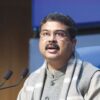Webinar on empowering education institutions to reopen safely
Shreyosi Chakraborty
In the backdrop of a Covid-induced unprecedented global educational crisis, Shycocan Corporation, the global licensee of Shycocan-the world’s first virus attenuation device that can disable the entire Coronavirus family in indoor spaces with upto 99.9 percent efficacy, in collaboration with EducationWorld hosted a webinar titled “Empowering Education Institutions to Reopen safely” with industry experts on August 27, 2021. The webinar threw light on several aspects of the ensuing crisis and the various implications and challenges of safely re-opening educational institutions and schools.
Summiya Yasmeen, managing director of EducationWorld moderated the event, where distinguished panelists like Dr. Joseph Emmanuel, director, Central Board of Secondary Education (CBSE); Alok Sharma, CEO, Shycocan Corporation; Dr. Muffazal Lakdawala, renowned surgeon; Dr. Swati Popat Vats, president, Early Childhood Association; Dr. Ashok Pandey, director, Ahlcon Group of Schools; Neha Kare Kanabar,fFounder, UNIMO – Universe Of Moms shared their views on the topic.
The webinar began with the moderator highlighting the major problem of India reeling with the adversities of the longest shutdown of educational institutions in the world. Presenting a comparative analysis, she shared that while Russia had closed their educational institutes for 13 weeks, China for 27 weeks, France for 12 weeks, India had imposed a country-wide shutdown of educational institutes for more than 70 weeks with some states yet to re-open. 70 percent of the population does not have access to digital infrastructure which poses a major hindrance towards leveraging technology to bridge the ever-widening educational gap. It thus becomes imperative to strike a balance and focus on ways to achieve educational continuity without compromising on the safety of the students.
Stressing the need to reopen schools, Alok Sharma highlighted the need for a viral defence device that would be useful in protecting children and adults alike from the clutches of the pandemic. He talked about Shycocan’s recent innovation of a plug-and-play, wall-mounted device, that disables the Covid-19 transmissions in indoor spaces and hence preventing infections. Although he reiterated the paramount importance of inoculation, social distancing, and other safety measures he also highlighted the need to leverage the technological advancements of the age too.
Dr. Joseph Emmanuel underlined that there was a huge visible learning gap. Although technology is helping us out yet there needs to be a conducive learning ethos for students. Admitting that although the right to life is more important, children should be reached out by principals and teachers personally, via telephone, or other digital platforms to help them recover from the unparallel loss.
As the discussion progressed, Dr. Muffazal Lakdawala talking about students and children being the least vulnerable of all said, “Schools were closed for a very long period and hence children have been protected. They may have been saved from the pandemic or the physical scars and injuries that they might incur, but can we save them from the mental trauma that has befallen them?”, questioned the surgeon.
He further shared a survey report from China, where one out of five students have been diagnosed with Post-traumatic Stress Disorder (PTSD) and one out of 14 children have been diagnosed with depression. He also focused on special children who attend special schools fitted for their needs. He stressed how difficult it is for them to study from their home in a digital setup without any physical touch. “Nothing in this world is completely safe and we need to take risks to move forward,” he added.
“We have always neglected the importance of children’s education in India. For other countries, they kept their schools closed only when the waves peaked. We need to stop this “ostrich attitude” towards our children. Schools are meant for social interaction amongst children and teachers also play a pivotal role in the overall mental development. We can decide and make a hybrid roll-out and begin the schools at least twice or thrice a week,” said Dr. Swati Popat Vats.
She further added that there is an urgent need to train the teachers and parents alike. “Our doctors have survived the pandemic. There are certain routines and basic hygiene that need to be followed if we want to safeguard ourselves. The Airgulp is one of the best examples. Parents and teachers need to focus on the basic ways to prevent children from getting infected with the virus.
“The three Vs-Virus, Variants, and Vaccination are dangerous and the fourth V which is more dangerous than these is ‘Vacillate’. We have become comfortable working from our homes. If we do not start thinking on our feet and start acting now, the gap will worsen to a point wherefrom it would be impossible to bridge, and even the best technologies in the world cannot save then,” said Ahlcon Group of Schools director Dr. Ashok Pandey.
During the closing minutes of the discussion, Neha Kare Kanabar took a dig at the schools stating that the reason it’s due to their lackadaisical attitude and lack of responsibility that the parents are scared and reluctant to send their students back to their respective school . “Whenever our children are with us, we take their responsibilities. But when we want to entrust the school authorities they tend to shrug off their responsibility and are quick to put the onus back on us. If anything goes wrong, it becomes the parents’ fault. The schools should start being more self-reliant, empathetic, and responsible towards the students,” she felt.
Watch the webinar here:
Also Read: School reopening status across India (August 2021)

















Add comment